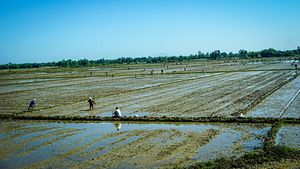Since introducing economic liberalization reforms in the 1980s, Vietnam has steadily been reconstructing its fledgling economy from the ruins of the long-running war that consumed the Indochina Peninsula for almost two decades. Over the last 30 years, the Doi Moi market reforms have propelled Vietnam to the forefront of regional trade, paving the way for economic overhaul through increased trade partnerships and integration into the global political economy. However, for a nation heavily dependent on the agricultural industry for national growth, climate change threatens to undermine decades of economic progress by seriously threatening water, food, and energy security, and thus, Vietnam’s newfound strength.
Vietnam shares the fruits of the Mekong River system with neighboring China, Myanmar, Laos, and Cambodia. Each nation has a vested interest in maintenance of the Mekong due to the role it plays in agricultural production and the southeastern trade routes that it facilitates. However, due to its low-lying coastal geography, the Mekong Delta is considered one of the most vulnerable deltas in the world. Average temperatures are predicted to increase by at least two degrees by the end of this century, with drastic changes in rainfall threatening to flood more than 40 percent of the Mekong Delta and three percent of the Red Delta. Outside of the Mekong, climate change is expected to increase the frequency and severity of extreme weather conditions, including widespread drought, fluctuating rainfall, and typhoons.
The effects of climate change are already beginning to impact Vietnam. Between 2015 and 2017, the Mekong Delta suffered a historic drought, which devastated crop production. At the same time, saltwater intrusion in other parts of the country contaminated potable water, which continues to threaten widespread water insecurity. If trends continue, agricultural production in Asia is expected to halve over the next 30 years, putting regional food security at risk.
A simulation exploring the trade implications of climate change on rice production in Vietnam in 2030 suggests that the country will face a food security crisis as a direct result of water insecurity, transforming its export-driven economy to one largely dependent on consumer spending for growth. Similar predictions suggest a climate change-induced spike in national food prices will coincide with a mass decline in trade volume, which could result in export bans similar to the country’s self-imposed ban on rice exports in 2008. This, in turn, is expected to heighten the risk of resource-related instability and unrest, which could ripple across the region in a way similar to that of the 2007-08 food price crisis.
Analysts believe that the damage caused by climate change to the agricultural industry will lead to contraction in other sectors, creating wide-scale job loss. This could result in mass rural-urban migration, which would place further strain on the fragile infrastructure and dwindling resources of Vietnam’s most highly-populated, industrialized cities. It could also increase cross-border migration as individuals search for greater economic opportunity and job security in neighboring countries. This not only threatens to undercut the stability of Vietnam’s developing economy, but it also threatens to disturb migration flows across the Asia-Pacific, which would impact regional stability.
While the government has crafted a range of policies to combat climate change, it continues to maintain that economic concessions made in the name of climate change mitigation should, for the most part, be the responsibility of developed nations. This mentality is underpinned by the belief that maintenance of modern agricultural techniques, which largely rely on fossil fuels for energy input, is integral to Vietnam’s economic growth and regional trading, with the national interest “increasingly invested in the continuity of this modernization model.”
While the impacts of climate change look likely to unhinge the country’s recent socioeconomic and development gains, this need not be the case. To reconcile a desire for economic growth with the environmental damage it can cause, the government must shift toward a more holistic and integrated approach to mitigate risk, reduce harm, and build resilience to climate change.
This will require a new way of thinking, as well as multi-sector transformation, including in the agriculture, energy, and water sectors. Economic policies geared toward the liberalization of trade, which, in the event of a food security crisis, would enable the country to produce the foreign exchange needed to make food purchases on the global market, will be critical in preventing a humanitarian emergency. Meanwhile, climate-resistant crop varieties and less energy-intensive agricultural techniques would boost the country’s adaptive capacity, and, in so doing, mitigate risk. Lastly, energy diversification would not only reduce reliance on fossil fuels, but could attract the foreign investment needed to support the economy of a country undergoing the massive transition toward a more sustainable future.
Madeline Brennan is an Editor at the International Peace Institute in New York.

































